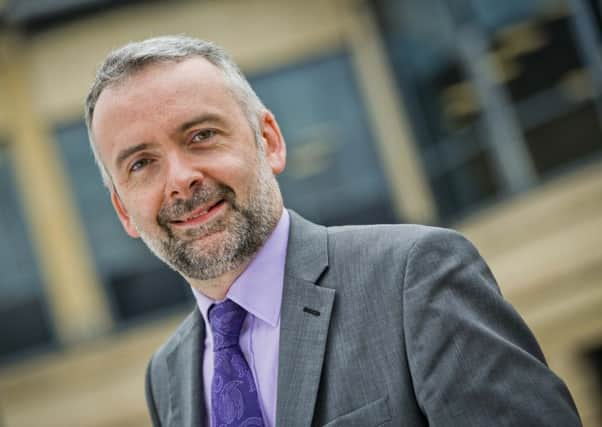Mark O’Donnell: Forces veterans have made an invaluable contribution – we must support them


If the Armed Forces Covenant is going to make a meaningful difference for our veterans, this means better joint working between all those organisations providing them with support. At Scottish War Blinded, we work with veterans of all ages whose experience of civilian life has been made more challenging because of their sight loss. We support veterans who have lost their sight in action and during their service, and also those who lose their sight after they have left the forces. Many of Scotland’s veterans are those who joined the forces through national service, and as this is an ageing community an increasing number are living with sight loss.
We work to ensure our members receive support not only for sight loss, but for other challenges they face as well. We do this by collaborating with a wide range of organisations. An example of this is how we work with a number of partners to tackle loneliness among Scotland’s veterans.
Advertisement
Hide AdAdvertisement
Hide AdScottish War Blinded supports veterans with sight loss across Scotland through our outreach workers, as well as at our two centres in Paisley and Linburn in West Lothian. Through this work, we have become increasingly aware that social isolation is a growing problem in the veterans community in Scotland. For members of Scottish War Blinded, their sight loss means they are at particular risk of experiencing loneliness, with all the negative impact on mental and physical wellbeing that brings. Research we carried out recently showed that over 90 per cent of our members had experienced loneliness, and access to the support provided by the charity was the most important factor in helping them overcome it.
It is vital government and charities work together to address this issue, as we are aware that sight loss is only one of a number of factors which results in veterans becoming isolated. So we were delighted when the Scottish Veterans Commissioner, Charlie Wallace, visited our Hawkhead Centre in Paisley to meet with members of Scottish War Blinded to hear about their personal experiences of loneliness, and to meet representatives of a number of organisations working with veterans to help tackle the problem. After this discussion, the Commissioner said: “I think we need to better connect all of the services that are being provided across the country.” We very much agree with him, and that is why we are pleased to be part of the Unforgotten Forces consortium, which has been established as a partnership between 15 leading organisations to provide support to older veterans, delivering a range of new services in areas including advice, access to healthcare, and tackling social isolation.
It is also vital that veterans know where to get help when they need it if they are not to become isolated. This requires the Scottish Government to encourage public services to collaborate better in providing support to veterans, and ensure they have the information they need. Charities have a role to play in this as well, and that is why we have been pleased to work together with Age Scotland and Action on Hearing Loss Scotland to produce a new free guide for veterans “Combatting Sight and Hearing Loss”. Veterans are at particular risk of developing hearing and sight loss, and if they don’t get their symptoms identified and treated quickly this can result in a number of additional problems, including isolation.
Scotland’s veterans have made an invaluable contribution to our nation for which we owe them a debt of gratitude. We can repay that debt by ensuring they have a positive transition into civilian life and a good later life too. This should be our ambition for every one of our veterans, and through better collaboration between all those supporting veterans we can work successfully towards that goal.
“Combatting Sight and Hearing Loss” is available online in the “Our Campaigns” section at www.royalblind.org, and free copies are available from the Age Scotland Helpline 0800 12 44 222.
Mark O’Donnell, chief executive, Royal Blind and Scottish War Blinded